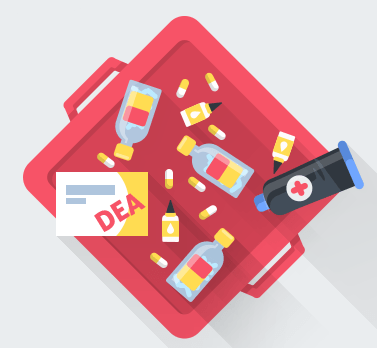Pharmacies around the country have been participating in the pharmaceutical take-back collection of prescription and over-the-counter drug programs. The dates and locations are preset and can be located in a clinic, hospital, retail environment or local law enforcement agency. Typically there are members of law enforcement available on site and the medication is accepted without any questions asked. However, due to the quantity and volumes of the medication, there are some that are returned that are considered to be higher risk of waste disposal.
The purpose of the take-back program is to reduce the number of medications that have been disposed of in methods that can harm people and the environment. Such behaviors as dumping meds in areas that they will eventually end up in water systems or landfills can have devastating and long-term effects.
EPA Rules and guidelines are fairly specific: “EPA recommends that household pharmaceuticals collected during a take-back event or program be incinerated. EPA prefers that the collected household pharmaceuticals be sent to a permitted hazardous waste combustor, but when that is not feasible, at a minimum they should be sent to a large or small municipal waste combustor.”
Another important EPA ruling includes: “Hospitals, pharmacies and other businesses generating pharmaceutical waste generally cannot use take-back programs or events to dispose of expired, unwanted or unused pharmaceuticals. Public collection events typically do not intend to manage waste from businesses or comply with the regulations applicable to business waste. Healthcare facilities and healthcare-related businesses that generate pharmaceutical wastes are responsible for appropriately managing their wastes in accordance with all local, state and federal environmental regulations.”
Medication take-back programs have been highly successful, but for any standard medical organization that generates pharmaceutical waste and wants to participate, they need to continue to use their current medical and hazardous waste disposal facilitators for their personally generated waste.
Identifying what might be considered ‘hazardous waste’ can be complicated and a bit confusing. The EPA has a complete guideline list, including the various rules. For the average pharmacy, hospital or clinic, it is advised that you have a specialist to review the information as it encompasses more than just the obvious. Many common medications fall under the description of hazardous due to their main ingredient content or simply because of the negative effect on the environment. These can include over the counter drugs all the way to addictive contents.
The full scope of the medication take-back programs has been designed around the ultimate disposal via incineration. However, many of those organizations that participate do not have incinerator abilities. Before becoming part of the community take-back program, any clinic, hospital or pharmacy must coordinate pickup and disposal with a professional waste disposal company, who have the facilities to incinerate and dispose of all medications in a safe and secure method that complies with all EPA guidelines.







